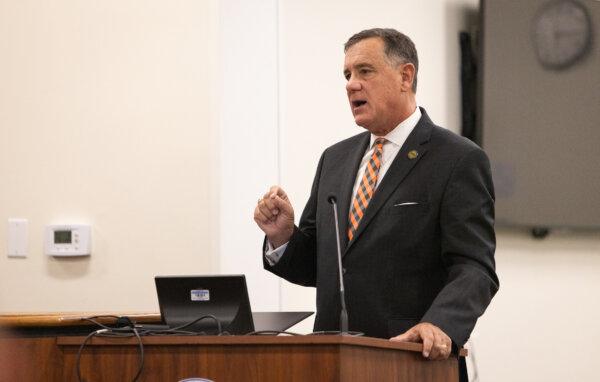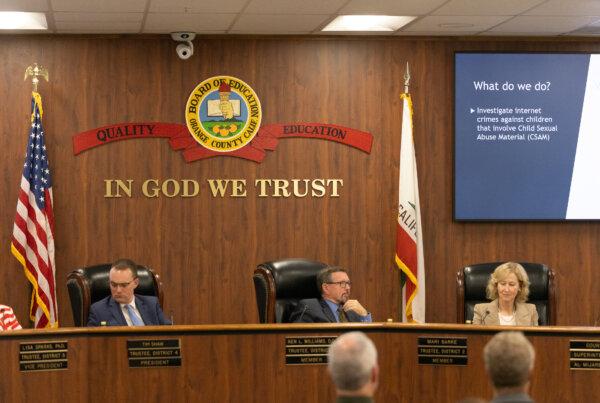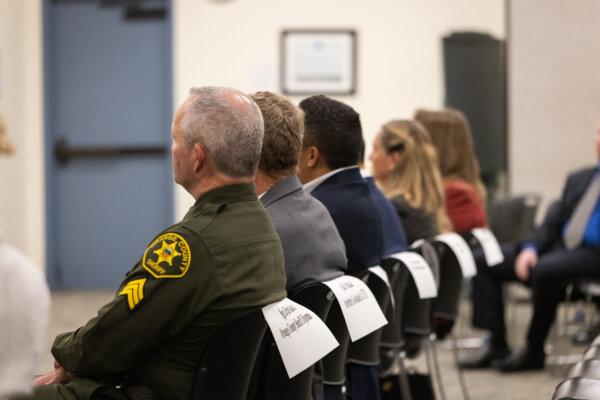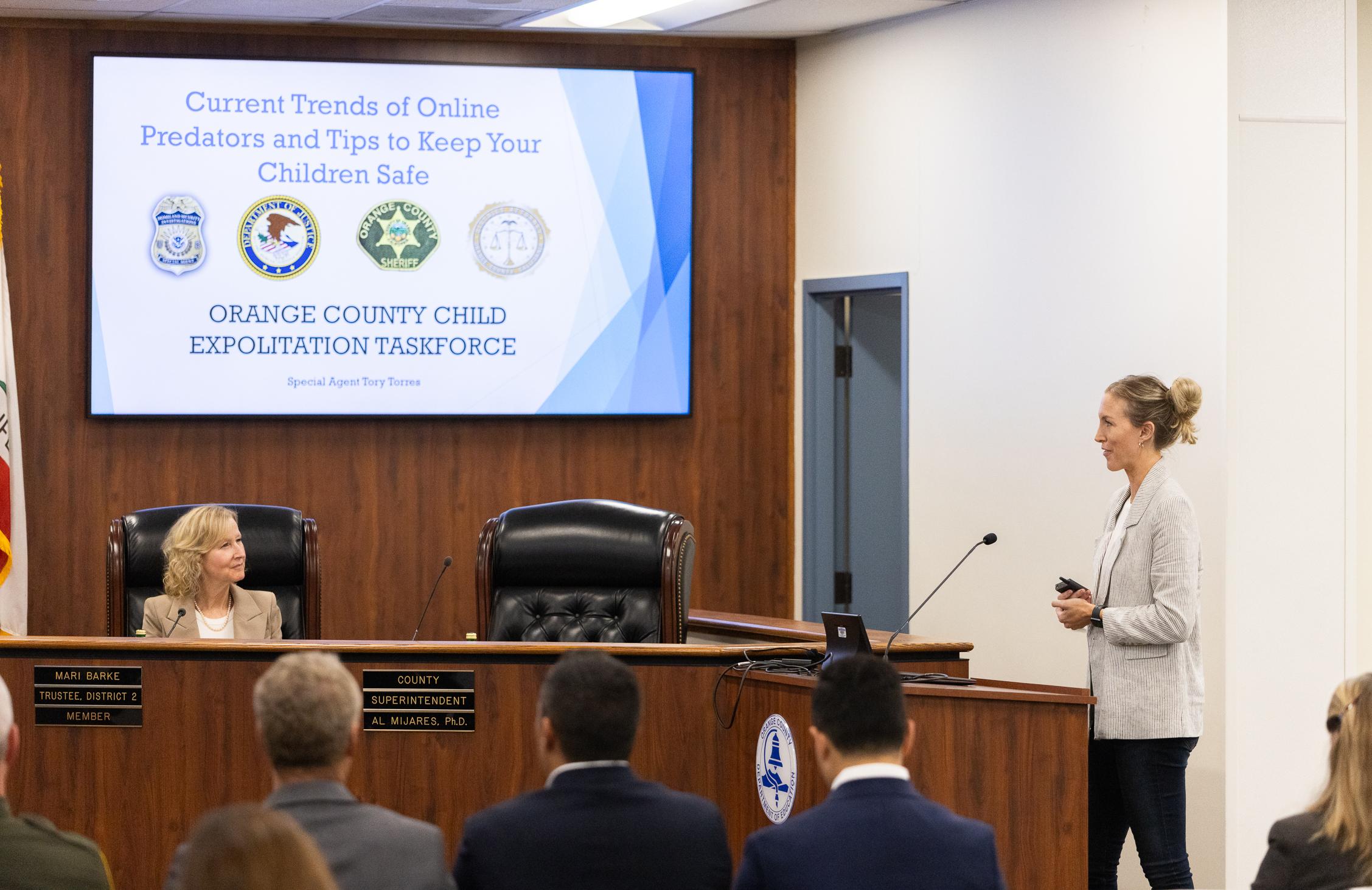Amid rising concerns of cybersecurity, child grooming, and fentanyl poisoning, the Orange County Board of Education in Southern California hosted a panel on Sept. 20 with experts who shared tips on how to keep children safe.
Trustee Lisa Sparks said that the board chose those topics for the panel because they are rising concerns in schools across the state, and the board wanted to inform both school staff and parents what they should be on the lookout for.
“When it comes to safety, education is the key to prevention,” Ms. Sparks told The Epoch Times. “The goal is for parents, community members, teachers, students and everyone to be more aware about these issues and to recognize the signs and symptoms that are kind of hidden in plain sight as well as on the internet.”
Fentanyl and Drug Crisis
Panelists who spoke about the fentanyl and drug crisis included Orange County Supervisor Don Wagner, Sgt. Brian Gunsolley of the Orange County Sheriff’s Department, and Toni McKinley, executive director of the Magdalene House in Austin, Texas, which works with survivors of human trafficking.Mr. Wagner said since 2016, Orange County has seen a 1,700 percent increase in fentanyl-related deaths—from 37 in 2016 to 673 in 2022.
He added that fentanyl, a synthetic opioid, was the number one cause of death for Orange County youth under 18 in 2021.

Orange County Supervisor Don Wagner speaks at the Orange County Board of Education building in Costa Mesa, Calif., on September 20, 2023. (John Fredricks/The Epoch Times)
“Fentanyl is a problem hitting our communities, every single one,” Mr. Wagner said.
To combat this, the supervisor told listeners that the county will make naloxone—a drug used to reverse the effects of opioids—available to anyone who feels they need it at the Orange County Health Care Agency, along with naloxone usage training.
“Our first responders and sheriffs have naloxone on them, but they’re not the [true] first responders, though—[the true first responders] are the parents or teachers that we’re trying to get the tools and information to help them deal immediately with that problem,” Mr. Wagner said.
Mr. Gunsolley echoed Mr. Wagner, adding that parents who suspect children are abusing drugs should have conversations about its dangers, and make a daily effort to connect with their kids.
“The dangers of drugs is not a one-and-done conversation, it should be ongoing as kids grow and develop,” he said. “And give [your kids] daily love and affection, even if you think they don’t deserve it—that’s when they need it the most. Because when they run into the difficulties of life, they will come to you.”
Ms. McKinley also emphasized the importance of parents connecting with their children, saying that youth who have experienced trauma are more likely to abuse substances than their peers who have not experienced trauma.
She shared the story of her own daughter, Jessica, who turned to drugs after she was sexually assaulted as a teen. An overdose took Jessica’s life in 2022, when she was just 23 years old.
McKinley encouraged those supporting survivors of trauma and addiction with empathy, non-judgement, and active listening, as well as with education on the consequences of drugs and addiction.

Trustees listen to guest speakers at the Orange County Board of Education building in Costa Mesa, Calif., on September 20, 2023. (John Fredricks/The Epoch Times)
Online Safety and Grooming
Other panelists—including Special Agent Tory Torres of the Orange County Child Exploitation Task Force, educator and advocate Brenda Lebsack, and Matt Friedman and Jack Britton, co-founders of cybersecurity company Avertere—shared online safety tips and pointed out ways that adults groom and stalk children online.Ms. Lebsack warned that some Orange County schools had posters promoting the National Suicide Hotline, which she said surveys children about their gender and sexuality without parental consent, and The Trevor Project, a national LGBT organization promoting chatrooms with what some say are controversial topics for young people.
The Trevor Project provides 24-hour access to counselors and other services for LGBT youth and features “TrevorSpace,” an online forum with hundreds of chatrooms on different topics.
On TrevorSpace—which is aimed at ages 13 to 24—Ms. Lebsack said she signed up for an account by merely entering a false date of birth. A predator trying to groom children online could easily do the same, she said.
Ms. Lebsack said the chatrooms including those with names like “Guilt, Pain, Secrets, Solace,” “Witchcraft Club,” “Polyamory Club,” “Furries United,” and “Bi+ and Mspec Folks.”
She said she investigated and tested the chatrooms and the suicide hotline, posing as a student.

Guest speakers wait to address Orange County Board of Education trustees in Costa Mesa, Calif., on September 20, 2023. (John Fredricks/The Epoch Times)
As for the suicide hotline, Ms. Lebsack said it surveyed her about her gender and sexuality, requiring her to choose from a list of 11 different genders or to write in however she identified if not on the list.
Ms. Torres said it’s important for parents to understand the dangers of websites such as these, as well as social media apps.
She said many of the cases her office receives of child sexual exploitation come from popular social media companies such as Facebook, Instagram, Google and WhatsApp—not just the “dark corners of the web.”
Predators often create accounts pretending to be young so they can befriend children online. After they befriend the youth, they will begin to “groom” them sexually by sharing inappropriate material and asking them to take their own photos.
Sometimes, predators will also use location-based apps such as “Whisper” that connect users to others in the same location, making it easy for predators to convince children to meet up with them in real life.
Ms. Torres advised parents to not let their children on location-based apps, to share inappropriate photos or to talk about inappropriate topics online.
Parents should set up ground rules, she said, including: only adding and messaging people they know in real life, only downloading apps approved by parents, no phones behind closed doors, weekly check-ins, and consequences for breaking the rules.
Meanwhile, Assemblymember Bill Essayli (R-Riverside) offered a legislative perspective.
While Mr. Essayli said he personally believes children should be kept off of social media for their own safety and mental health, he said he hopes legislators will focus on consequences for bad actors to keep them from targeting youth.
“I want to focus on deterrence,” Mr. Essayli said. “Prosecutors need to go after bad actors. It’s important to send a clear message: We take these seriously, and [we need to] send them behind bars for a very long time.”














